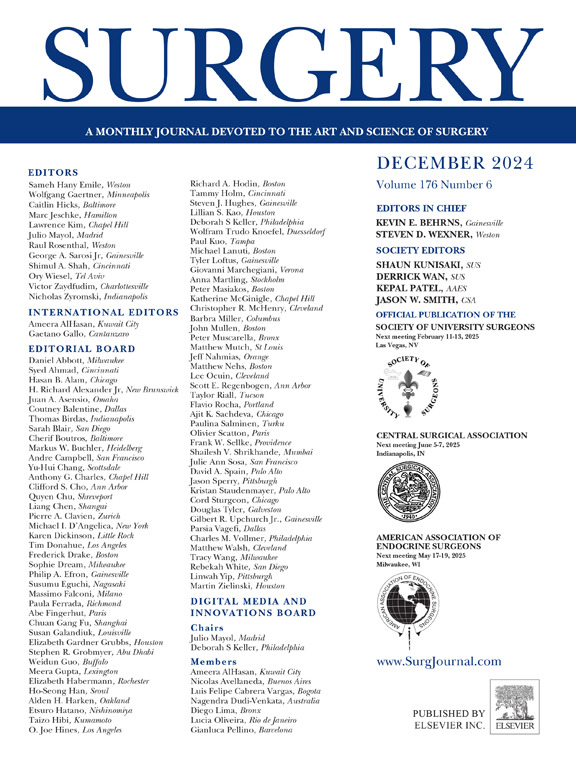Neoadjuvant chemotherapy improves overall survival in stage III but not in stage II colon cancer: A propensity score–matched analysis of the National Cancer Database
IF 3.2
2区 医学
Q1 SURGERY
引用次数: 0
Abstract
Background
Neoadjuvant chemotherapy has been recently suggested for advanced colon cancer, but little is known about the impact on short-term outcomes and overall survival. In this study, we aimed to evaluate the effect of neoadjuvant chemotherapy on survival in stage II-III colonic adenocarcinoma.
Methods
A retrospective analysis of the colon cancer US National Cancer Database from 2006 to 2019 was performed. Patients treated with neoadjuvant chemotherapy were matched using propensity score to controls (ratio 1:1). The primary outcome was 5-year overall survival.
Results
In total, 1,275 patients (1.3%) with clinical stage II-III colonic adenocarcinoma received neoadjuvant chemotherapy. After matching, the neoadjuvant chemotherapy group included 783 patients. The restricted mean 5-year overall survival in the neoadjuvant chemotherapy group was significantly higher compared with controls (48.9 vs 44.9 months, P = .003). Stratified by disease stage, neoadjuvant chemotherapy was associated with a significantly longer overall survival (47.5 vs 41.2 months; P = .001) in stage III while showing an equivalent overall survival in stage II (50.3 vs 48.6 months; P = .2). The benefit in overall survival was pronounced in stage T4 and positive nodal disease. Cox regression analysis in patients with stage III revealed that neoadjuvant chemotherapy was associated with a 21% reduction in mortality risk (hazard ratio, 0.79; 95% confidence interval, 0.65–0.96; P = .01). Neoadjuvant chemotherapy was associated with lower rates of 30-day readmission (3.5% vs 7.4%, P = .001), 30-day mortality (0.9% vs 3.8%, P < .001), and 90-day mortality (2.9% vs 8.5%, P < .001).
Conclusion
Preoperative neoadjuvant chemotherapy is associated with improved overall survival in patients with stage III colon cancer, mainly in patients with T4 disease.

新辅助化疗提高了III期结肠癌的总生存率,但没有改善II期结肠癌:国家癌症数据库的倾向评分匹配分析
新辅助化疗最近被建议用于晚期结肠癌,但对其短期预后和总生存期的影响知之甚少。在这项研究中,我们旨在评估新辅助化疗对II-III期结肠腺癌患者生存的影响。方法对2006 - 2019年美国国家癌症数据库的结肠癌数据进行回顾性分析。接受新辅助化疗的患者使用倾向评分与对照组进行匹配(比例为1:1)。主要终点是5年总生存率。结果1275例(1.3%)临床II-III期结肠腺癌患者接受了新辅助化疗。经配对后,新辅助化疗组共783例。新辅助化疗组的限制平均5年总生存期明显高于对照组(48.9个月vs 44.9个月,P = 0.003)。根据疾病分期分层,新辅助化疗与更长的总生存期相关(47.5个月vs 41.2个月;P = .001),而在II期显示相同的总生存期(50.3 vs 48.6个月;P = .2)。在T4期和阳性淋巴结疾病中,总生存期的获益是明显的。III期患者的Cox回归分析显示,新辅助化疗与死亡风险降低21%相关(风险比,0.79;95%置信区间为0.65-0.96;P = 0.01)。新辅助化疗与较低的30天再入院率(3.5% vs 7.4%, P = 0.001)和30天死亡率(0.9% vs 3.8%, P <;.001)和90天死亡率(2.9% vs 8.5%, P <;措施)。结论术前新辅助化疗可提高III期结肠癌患者的总生存率,尤其是T4期患者。
本文章由计算机程序翻译,如有差异,请以英文原文为准。
求助全文
约1分钟内获得全文
求助全文
来源期刊

Surgery
医学-外科
CiteScore
5.40
自引率
5.30%
发文量
687
审稿时长
64 days
期刊介绍:
For 66 years, Surgery has published practical, authoritative information about procedures, clinical advances, and major trends shaping general surgery. Each issue features original scientific contributions and clinical reports. Peer-reviewed articles cover topics in oncology, trauma, gastrointestinal, vascular, and transplantation surgery. The journal also publishes papers from the meetings of its sponsoring societies, the Society of University Surgeons, the Central Surgical Association, and the American Association of Endocrine Surgeons.
 求助内容:
求助内容: 应助结果提醒方式:
应助结果提醒方式:


